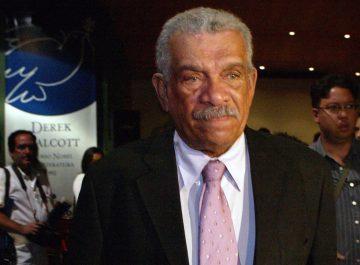 Benjamin Ivry in Forward:
Benjamin Ivry in Forward:
Derek Walcott, the Nobel Prize-winning poet from the West Indies who died March 17 at age 87, was long inspired by Jewish culture, history and friendships. As the literary scholar Bénédicte Ledent has pointed out, Walcott’s poem “A Far Cry from Africa” draws a “parallel between blacks and Jews.” The poem, about the Mau Mau Uprising, a 1950s military conflict in British Kenya, Walcott ironically describes the rebels as “savages, expendable as Jews.”
Paula Burnett, another informed reader of Walcott’s poetry, notes that although the “paralleling of the New World black experience with that of Jews in the Holocaust had been a long-standing theme of Walcott’s, the theme of Nazi atrocities takes on a fresh prominence” in his collection, “The Fortunate Traveler” (1982) In it, swirling images express the inhuman treatment of people of color by colonizers, in a world overwhelmed by the Holocaust, so that the abbreviation A.D., instead of Anno Domini, appears to represent After Dachau. The Americanist Eric J. Sundquist points to a key essay by Walcott, “The Muse of History,” published in 1974, in which African slaves arriving in the West felt “identification with Hebraic suffering, the migration, the hope of deliverance from bondage… the passage over our Red Sea was not from bondage to freedom but its opposite, so that the tribes arrived at that New Canaan chained.”
More here.
